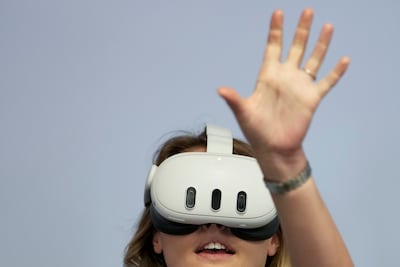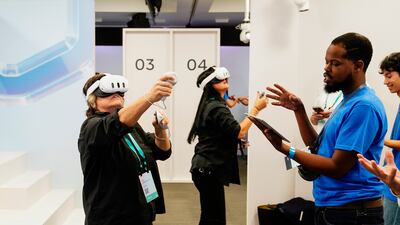Meta Platforms, which occupies more than half of the augmented reality and virtual reality headset market, is expected to continue its dominance with the launch of Quest 3, defying the overall industry trend of a downhill trajectory.
Global AR and VR headset shipments dropped for the fourth quarter in a row as volume fell 44.6 per cent annually in the three-month period that ended on June 30, according to the International Data Corporation.
Meta occupied a 50.2 per cent market share during the quarter, followed by Sony (27.1 per cent) and ByteDance (9.6 per cent), said the Massachusetts-based researcher, without disclosing the exact numbers.
“Meta remains the top contender to dominate the VR market primarily due to [Mark] Zuckerberg's massive investment in the segment ahead of the competition in 2021 and 2022,” Thomas Monteiro, senior analyst at Investing.com, told The National.

“Although the company has shifted focus since then, cutting costs and delivering what Zuckerberg dubbed efficient capital management, it will still be a while before others can catch up with those years.”
The global AR/VR headset market is expected to reach about $5.9 billion by 2030, from $4.1 billion last year, growing at an annual growth rate of 5.3 per cent between 2023 and 2030, according to business intelligence firm Vantage Market Research in Washington.
In the US alone, AR/VR headset market revenue is expected to hit $1.88 billion this year, up from $1.84 billion last year, Statista said
However, total shipments of AR/VR headsets are expected to drop 3.2 per cent annually to 8.5 million devices this year, the IDC said.
But the researcher predicted a market rebound next year, growing 46.8 per cent year on year thanks to new hardware from Meta and ByteDance, the introduction of Apple's Vision Pro, and the growing presence of smaller companies. By 2027, the market is expected to reach 30.3 million units globally, growing 36.3 per cent annually.
“Over the past several years, Meta and Qualcomm have dramatically improved the AR/VR landscape, allowing the industry to move beyond simple phone-based VR to stand-alone headsets that have paved the way for VR gaming and numerous enterprise use cases,” said Jitesh Ubrani, research manager at IDC.
“However, more companies have skin in the game as Sony along with MediaTek and Apple have joined the race to enable next generation experiences and potentially bring AR and VR technologies to an even larger market.”


